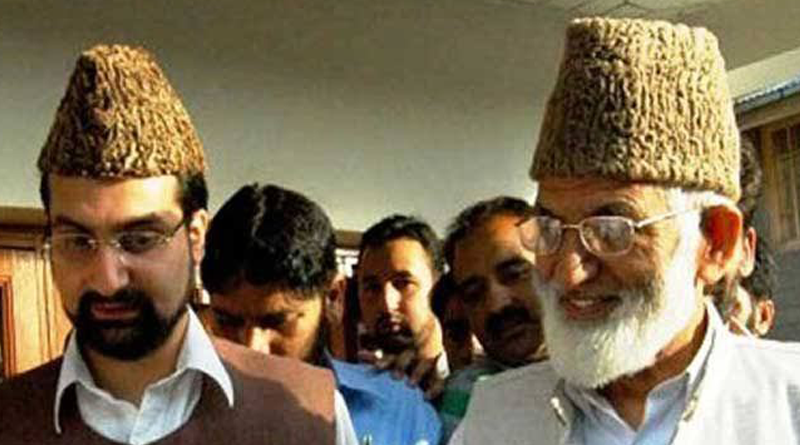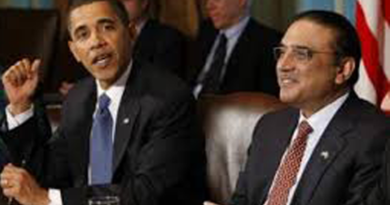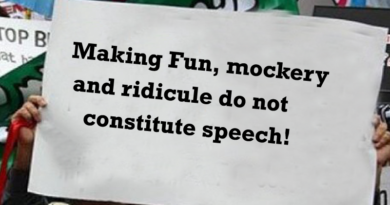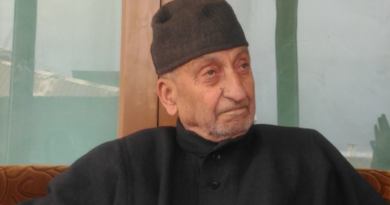For the Consideration of Freedom Movement Leaders
Once again we have an uprising in Kashmir. Essentially there is nothing new about it, apart from the fact that this time it was Burhan Wani”s custodial killing, and subsequent brutality by government forces that added fuel to the already existing fire, and brought people on streets.
Kashmir”s well-wishers everywhere are deeply concerned about two things, namely: how long the current uprising will sustain and, more importantly, how effective it will be in delivering results. In these lines, I will first make some constructive comments on the ongoing Freedom Movement (Hurriyat G, Hurriyat M and others), and then towards the end, in all humbleness, make a practical suggestion with sustainability and effectiveness as the two main considerations.
In any situation, one has to be fully informed about, and aware of, the existing realities and active forces in that situation. One should have an absolutely clear understanding of friends and foes, factors and realities that weigh for and against one”s cause.
India”s military is an obvious and prima facie enemy of our cause, movement or any related uprising, like the present one. However, there is something bigger that we often miss or underestimate and that is the India-created farcical political system in Kashmir, often referred to as the mainstream political system comprising the government and the opposition.
In its attempt to quell mass uprisings, India uses armed troops but more than that it is this political system that is being propped up by the Indian state as evidence of Kashmir people”s willing cooperation with India, by voting governments to power and used to cast those agitating on the streets as foreign-sponsored instigators.
You may rubbish India”s claims – and deservedly so – but it may not be as obvious in Kashmir as it is outside, that this strategy does carry weight to the extent that India buys for itself the required space to kill and maim (and now blind) Kashmiris. You may ask why such a bogus claim carries any credibility with the outside world.
The answer is: We are living in a world with set norms – good and bad – conventions, and rules of conduct. The freedom movement in Kashmir cannot ignore these. There are two things we need to note in this regard.
First, one of the rules is that the state has monopoly over violence, that is why all states have coercive apparatus: police, army, weaponry and ammunition. If the military kills an innocent person, the killer will not be called a terrorist. So the state”s actions to a large degree (varying from state to state) enjoy legitimacy.
Second – and this carries more important and concrete practical implications – democratic political systems, fake or genuine, are regarded as the only overarching umbrellas within which people”s aspirations can be heard, debated, promoted and translated into concrete results. India militarily invaded Kashmir in October 1947, but had started making political inroads in 1930s thus creating a political system that could provide space and legitimacy to armed troops and create a proper army of what would otherwise be intruders.
India would not have been able to do what it does if a Kashmiri local government, assembly and opposition were not in place, not because they lend any real strength to India”s power and capability but because they provide the convenient cover Indian forces need to carry out their brutal actions. Now, what is the point here? The people of Kashmir through their sufferings, struggle and sacrifices have been saying something and their aspirations are articulated through the institutional structures of the Freedom Movement.
Therefore, the Freedom Movement articulates the sentiment and popular aspiration of Kashmiri people. However, it is not universally regarded as such and is denied the legitimacy it inherently has. Why? Not because the world outside does not know the plight of Kashmiri people; everyone knows the story. The problem is presentation upon which depends the treatment.
The story of Kashmir – the issue, people”s struggle, sacrifices and miseries – should be presented through the proper channel, which in turn will determine the treatment/response it receives. Imagine for a moment, the legislative assembly in Kashmir passing a resolution or even 20 MLAs unsuccessfully moving a resolution asking India to hold plebiscite, do you think the Indian state could resist?
No way, it will cause a political earthquake and bring India to its knees. It may take rash measures, dismiss assembly, arrest MLAs but it cannot undo the heavy impact such a step would have. After all, how can it deny a people their rightful aspirations, particularly when these are expressed clearly through universally accepted proper and legal channels, in this case, an elected assembly?
One might ask whether India would allow that in the first place, especially when it took such brutal measures to stop Muslim United Front from winning in 1987. This and other such questions like this are sensible and genuine but I will not entertain these here simply because I am not, per se, putting forward a proposal for the Freedom Movement to stand in the elections in which case I was obliged to consider, and discuss all practicalities involved in such a proposal.
Neither am I deploying an argument for or against participating in elections; I might do that at a later date though I may hasten to add that the thinking of Freedom Movement on this question seems frozen in time and some rigorous creative thinking is desperately needed.
My point here is simple: the most precious, otherwise difficult to cultivate element in the Freedom Movement of Kashmir is the mass sentiment variously known as ”anti-India sentiment”‘, ”pro-Pakistan sentiment” and of late, the sentiment of ”azadi”.
This sentiment represents people”s rejection of Indian-imposed status quo and demonstrable will to change it. This sentiment enjoys a certain degree of respect and legitimacy in the eyes of the world. As such, it could be turned into the most potent tool to achieve our goals. Unfortunately, that is not happening and this precious asset is not bringing worthwhile gains for Kashmir”s freedom despite people”s relentless and brutal suffering.
We earlier referred to two hostile entities: India”s military, which of course is absolutely visible, and; the political system which India holds against us. Propped up by Indian intelligence, this system does not speak for anyone, it has no connection with the people it claims to represent, yet it is used by India to offset the genuine voice of Kashmiris.
The late Islamic ideologue, Dr Ali Shariati said martyrdom has two elements, one; blood, the other; message. A martyr makes a point by laying down his/her life. Blood is spilled but the message that goes out immortalises the martyr and advances the cause. As such, if the Army is killing people demanding freedom, the political system is killing the message of freedom and we are left with nothing. This is not my perception alone; many have sensed it all along yet our response to India”s political challenge seems to have revolved around hartals, chalos, and boycotts.
One might retort back saying that is all we can do, India is not letting us do anything more, there is no political space. While factually right, the moot point is whether the gravity of this political challenge been ever realised. Without narrative, without strategy, without policy, what does that point to? By this point at least, we should have a narrative that reflects the collective consciousness of Kashmiri people, their pain and suffering, aspirations and vision of future. Unfortunately, the discourse continues to revolve around separatism and separatists which erroneously projects the freedom movement as being on the fringe of Kashmir”s political landscape thus obscuring its true scope, its depth and width.
The Kashmir issue defines Kashmir politics at the most basic level; it relates to mass sentiment and therefore best represents mainstream Kashmir politics. These are the things to be addressed but now, since the Freedom Movement is not part of the Indian-sponsored mainstream political system, it should work towards creating an independent and parallel political system that is so strong and mass based as to render the mainstream political system defunct.
Elections do not happen because potential candidates fear reprisals in the form of social boycott, similar to the years of the J&K Plebiscite Front, when the so-called pro-accession elements were made outcasts. In effect, letting India itself speak for Kashmir with no self-styled geniuses paraded as ”elected representatives”.
I have a practical suggestion in this regard which I hope will receive due consideration.
India has been imposing democracy on us as the United States has been bombing from skies democracy, human rights and freedom into parts of the world. Let us do something to make India taste the fruits of this by paying it back in like. We have “elected representatives” everywhere in the valley. Let people start picketing around the houses of MLAs, and peacefully raise slogans demanding MLAs resignation from the party as well as assembly.
This demand makes perfect sense, in Kashmir, or in any human society. The situation goes something like this: people will ask their “representative” to address their grievance, as is their perfect right. The grievance is that a person(s) has been killed or maimed by forces and call upon the MLA to deliver due justice. Needless to say, this is asking too much; the MLA, if rich, may visit the moon or outer space by booking a ticket with Virgin Galactic (British company to offer commercial space flights) but cannot hold a mere jawan of Indian forces accountable.
Since they failed in their sworn duty of upholding justice, they must resign and join the only remaining avenue for advancing the cause: organized civil protest. This picketing can be planned as a sustainable campaign over a period of time with set targets and objectives to be achieved at the end of it.
***
Dr. Syed M Inayatullah Andrabi is a well-known figure in the circles of political Islam. Born in Srinagar, the capital city of Indian Held Kashmir, Dr Andrabi has been intimately involved at the intellectual level with the global politics and political issues since his student days in 1980 at Pune (India), where he completed his Ph.D. in Linguistics in 1983 at the Centre of Advanced Study in Linguistics, Deccan College, University of Pune, Pune, India. Upon completing his doctorate he returned home to join the University of Kashmir, first on a post-doctoral fellowship and later as faculty, but could not continue because of the deteriorating security situation in Kashmir, and had to move to United Kingdom in 1994 where he continues to live since along with his wife and five children.




